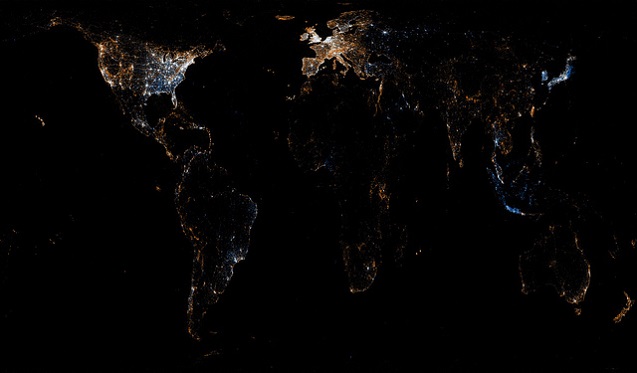
 Eric Fischer / Flickr)” width=”637″ height=”373″ />World map of Flickr and Twitter locations. (Image: Eric Fischer / Flickr)
Eric Fischer / Flickr)” width=”637″ height=”373″ />World map of Flickr and Twitter locations. (Image: Eric Fischer / Flickr)
How large of a role is Twitter playing in Turkey’s ongoing protests? Large enough to prompt Prime Minister Recep Tayyip Erdogan to say, “Social media is the worst menace to society.” No doubt, many of Turkey’s citizens would describe Erdogan using similar terms.
Erdogan condemned Twitter on a televised speech, also decrying that “the best examples of lies can be found there.” The Prime Minister’s words were followed up with actions: Turkish officials arrested 25 people for using Twitter to “encourage rebellion… and making propaganda.” In essence, certain social media users were targeted for spreading word about the growing protests, a movement the Turkish government continues to downplay.
Nonetheless, the arrests have only spawned more activity on Twitter. Citizens continue to unite not only to defend Gezi Park, but to contest a government that does not represent their interests.
This is hardly the first time people have utilized Twitter to organize against their governments. Tunisia and Egypt led the charge two years ago with successful results. Social media, especially Twitter, has given the voiceless a voice and connected people with similar ideologies. Revolutionary actions that once would have been nearly impossible to coordinate are popping up thanks to tools like Twitter.
Social media is especially useful in countries where the media ignores dissent. Turkey’s press is reporting on just about anything other than the protests and police violence happening outdoors. With no public representation of their struggles, the Turkish people have naturally taken to other forms – like Twitter – to disseminate images and information.
That’s why Turkey’s government is threatened enough by social media to haphazardly arrest people for using it. And that’s also why other governments crack down on social media. During Egypt’s protests, the government did its best to block Twitter and internet from its people to prevent further organizing. Meanwhile, Saudi Arabia is advocating for and en to anonymity on Twitter, presumably in part to know who is responsible for sharing radical political ideas.
Initially, Twitter’s role in global uprisings was popular and, as such, good for business. It even fought U.S. government requests to grant it access to private Tweets. Yet as the company grows and aligns with other massive corporations, its priorities have shifted. China blocked Twitter altogether after people shared news of the Urumqi riots, but has since worked out a deal where it heavily censors Chinese Tweets instead.
Social media was not a threat when it was viewed as a tool to browse humorously captioned cat photos and inform people what you’re eating for lunch. But as revolutionaries recognized its potential to democratize ideas, governments have fought to control it.
The elite have power over just about everything. They create the laws, they own the resources and they control the media. The internet is a rare, untamed exception, where the masses have found a venue for freedom of expression and action. As a result, governments now want to take ownership of social media, as well.
That’s why internet-restricting laws like CISPA and SOPA pose more of a threat than they appear to on the surface. It is a preemptive attack to claim the internet as the government’s own tool, before the people can harness its power to counter the existing establishment.
Twitter has the power to liberate. The question is: Will the people be able to free themselves before social media is taken from them?
Speaking against the authoritarian crackdown
In the midst of a nationwide attack on civil liberties, Truthout urgently needs your help.
Journalism is a critical tool in the fight against Trump and his extremist agenda. The right wing knows this — that’s why they’ve taken over many legacy media publications.
But we won’t let truth be replaced by propaganda. As the Trump administration works to silence dissent, please support nonprofit independent journalism. Truthout is almost entirely funded by individual giving, so a one-time or monthly donation goes a long way. Click below to sustain our work.